
Search the library catalog for books, journals, and online links to articles, videos and a whole lot more
If you are a student or faculty member at Brandon University, you can access resources from off campus. Click what you need, and you'll see a white screen asking you to log in. Once you log in, it should link to the resource you clicked.
To log in, you will need your Brandon University username and password - the same username and password you use to log into the Brandon University network when you're on campus. If you have not claimed your username and password or you are having trouble logging in with those, you should contact the Brandon University Help Desk (Phone 571-8500 Monday -Friday 8:30AM to 4:30PM). You can also claim the id yourself.
You will probably use a number of anthologies during your English degree to access poems, short stories, plays, essays, and other information about authors and works of literature. The library has a number of these collections of writing, in various editions.
Thorough and helpful introductory matter, judicious annotation, complete texts wherever possible--this Eighth Edition is a collaboration between six new editors and six seasoned ones. Under the direction of Stephen Greenblatt, General Editor, the editors have reconsidered all aspects of the anthology to make it even better.
One of the best annotated anthologies of Canadian poetry and prose, ranging from the eighteenth century to the present. Volume I contains the work of 40 writers with 200 pages devoted to poetry and 350 pages to prose, including not only short fiction but five autobiographical pieces, eight essays of literary criticism, and a play. Many cross-connections in related subject matter, and introductions to the writers and their work, with annotations.
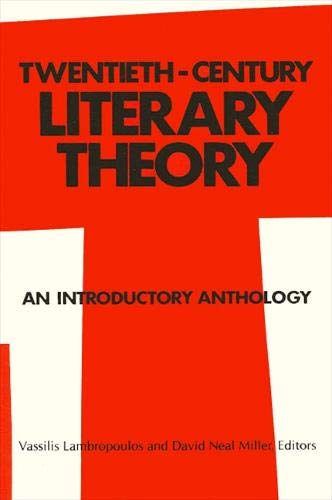
Ten topics reflect contemporary theoretical interests and guide the reader through fundamental questions, from the formation to the uses of theory, and from the construction to the interpretation of literature. Covers scholarship from both the United States and Europe and goes beyond traditional categories by focusing on issues rather than writers or critical movements, thus providing a forum for the continuing discussion of what theory is and does.
Covers a wide range of Middle English literature and supplies punctuation, capitalization, and accent marks when necessary to aid in comprehension by the inexperienced reader. The supplementary references include comparative media, since literature forms only a part of the whole cultural context.
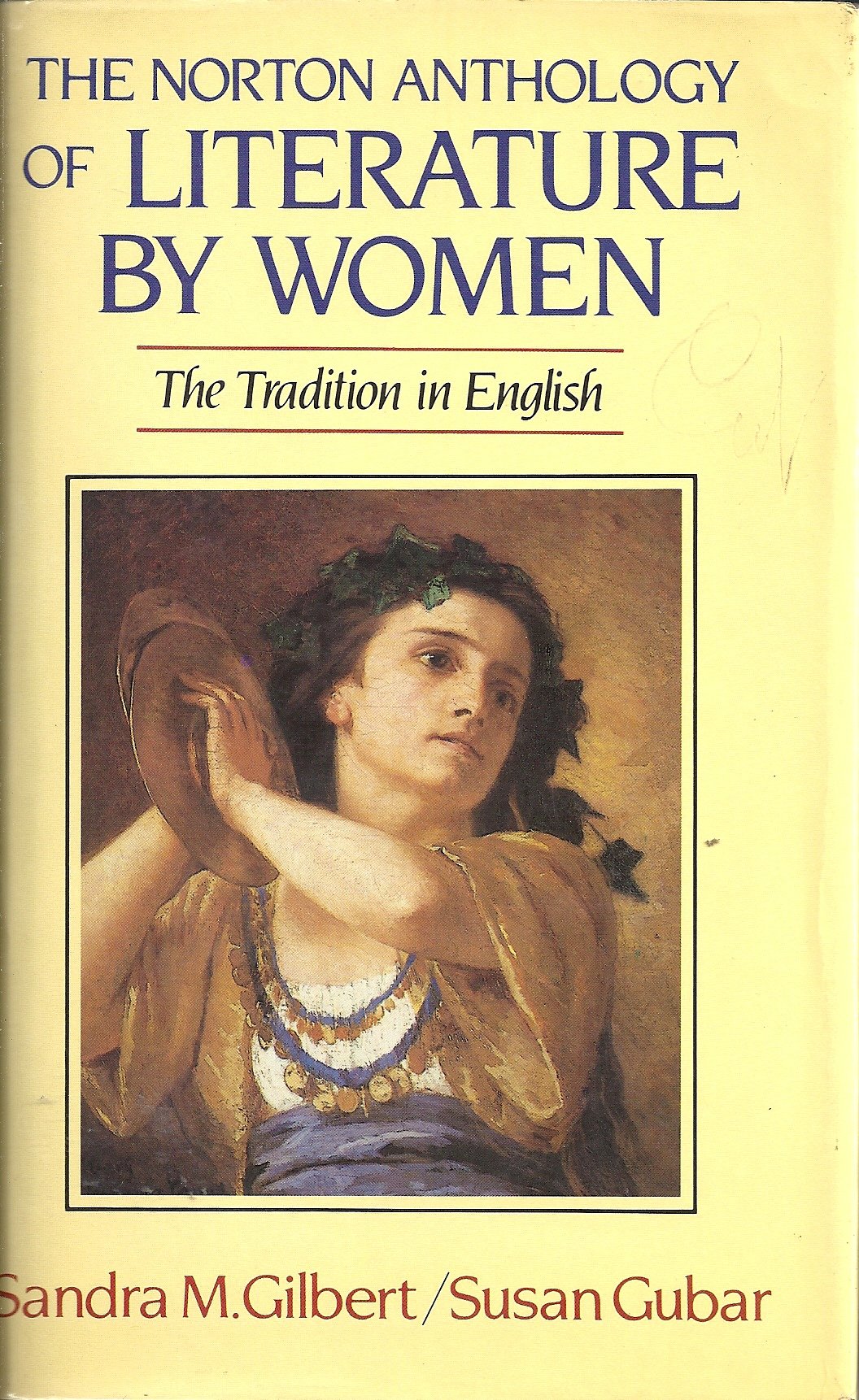
This anthology collects the novels, stories, poems, essays, memoirs, diaries, and letters of more than 150 writers--American, English, Canadian, and others writing in English.
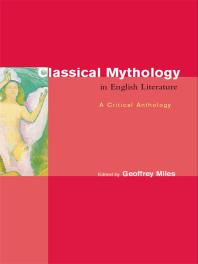
Brings together a range of English versions of three classical myths: Orpheus, the great musician and his quest to free his wife Eurydice from death; Venus and Adonis, the love goddess and the beautiful youth she loved; Pygmalion, the master sculptor who fell in love with his creation. Each section begins with the classical sources and ends with contemporary versions, showing how each myth has been used/abused or appropriated since its origins
Not an anthology per se, but a collection of essays that diagnoses the current state of literary and cultural studies. Includes a chapter analyzing and dissecting the The Norton Anthology of Theory and Criticism (which Leitch edited), an important text in any undergraduate study of literature.
A remarkable variety of Victorian nonfiction prose, both classic and lesser known. Draws upon the insights of recent theoretical approaches to literature and culture to present a complex range of responses to Victorian issues, thus inviting modern readers to explore the many voices of the period and to re-envision the Victorian era.
Documents this historically significant literary genre through 16 complete slave narratives from difficult-to-find texts, accompanied by a preface, explanatory notes, and suggestions for further reading. Redefines current thinking in the field by closely examining how these authors used language, structured their writing, and crafted their autobiographies, and provides the broad context necessary to understand the literary, social, and intellectual traditions from which these writings developed.
Love Beyond Body, Space, and Time is a collection of indigenous science fiction and urban fantasy focusing on LGBT and two-spirit characters. These stories range from a transgender woman undergoing an experimental transition process to young lovers separated through decades and meeting in their own far future. These are stories of machines and magic, love, and self-love.
A thorough survey of the growing body of Canadian creative non-fiction, covering the areas of memoir, personal essay, cultural journalism, lyric essay, and nature or place essays. These works are only a sampling of the diversity of Canadian writing, but together they create the best possible beginning for the exploration of this intriguing genre.
The library has a number of Cambridge Companion handbooks that compile scholarly writing by various authors on specific themes and on specific authors. If you enter the search terms "cambridge companion literature" in the library catalogue search you will see a full list of these books, but here are some examples:
A clear and accessible introduction for those encountering Old English literature for the first time. Provides a discussion of the literature of the period 600 to 1066 in the context of how Anglo-Saxon society functioned. Offers an overview of the study and cultural influences of Old English literature to the present day.
Comprehensive introduction to major writers, genres, and topics in Canadian literature. Broad surveys of fiction, drama, and poetry and chapters on Indigenous writing, autobiography, literary criticism, writing by women, and urban writing. Nature-writing, exploration and travel-writing, and short fiction also discussed, and a substantial chapter on francophone writing is included.
Includes an examination of the development of the novel from the epic, history, romance, the picaresque. Discussion of the ways fiction developed in response to specific political, social, and economic forces, and how it has played a crucial role in the formation of those forces. Examines the recent interest in graphic novels as well as data, digitization, and a global literary marketplace's role in shaping the future of the novel.
Essays covering the 150-year history of the African American novel, addressing some of the major issues in the genre: passing, the Protest novel, the Blues novel, and womanism, among others, examining works by Ralph Ellison, Leon Forrest, Toni Morrison, Ishmael Reed, Alice Walker, John Edgar Wideman, and many others.
Presents a range of approaches to the field, drawing on a range of primary material from the medieval period to postmodernism and from several countries, disciplines and genres. Both for students of literature and for students of gender studies and readers interested in the interactions of feminism, literary criticism and literature.
Discussion of narrative poems, the Sonnets, and poetry within plays, considering the playwright's immersion in English Renaissance politics, religion, classicism, and gender dynamics. Also includes chapters on the relationship between poetry and performance, and on the reception and influence of the poems. The volume includes a chronology of Shakespeare's life, a note on reference works, and a reading list for each chapter.
A multi-disciplinary approach to literature on film and television considering broad topics such as the issue of adaptation from novels and plays to the screen, canonical and popular literature, fantasy, genre, and adaptations for children, as well as case studies which allow the reader to place adaptations of the work of writers within a wider context.
There are a number of general dictionaries in print in the library, as well as some specialized dictionaries that provide vocabulary for specific disciplines or areas of literature. Examples of targeted dictionaries are below, and you can find more general dictionaries listed here.
Provides explanations of almost twelve hundred terms, covering everything from the ancient dithyramb to the contemporary dub poetry. Also provides coverage of traditional drama, rhetoric, literary history, and textual criticism. Contains easy-to-use pronunciation guides for more than 200 terms, is thoroughly cross-referenced, and now offers a regularly updated companion website.
Containing over 750 in-depth entries covering the whole range of critical theory, including the Frankfurt school, cultural materialism, cultural studies, gender studies, film studies, literary theory, hermeneutics, historical materialism, internet studies, and sociopolitical critical theory. Entries clearly explain even the most complex of theoretical discourses.
Shakespeare is the most quoted--and probably also the most misquoted--writer in the English language. In this topically arranged collection of quotations, writers and speakers can find not only sayings on any of 600 subjects, but can be assured of the right wording and the precise source. Also contains keyword index.
This 2-volume dictionary consists of 143 essays covering themes relating to adventure, family life, the supernatural, eroticism, status, humor, idealism, terror, etc. Each entry contains a definition of each literary theme, a sketch on its origin and background, the significance of the theme in world literature and related information, as well as a selected bibliography. A cross-index to themes and motifs will enable the reader to find information on secondary or related topics.
Designed to help the modern reader understand how biblical motifs, concepts, names, quotations and allusions have been transmitted through tradition and used by authors of English literature from the Middle Ages to the present. The book includes several hundred encyclopedic articles representing the disciplines of biblical studies, theology, patristics, and literary studies.
A dictionary of the terms used in discussing verse techniques and some of the larger aspects of poetry together with examples of poetic practice. Alexandrines, madrigals, prosody, and dozens of other technical terms are exemplified and discussed.
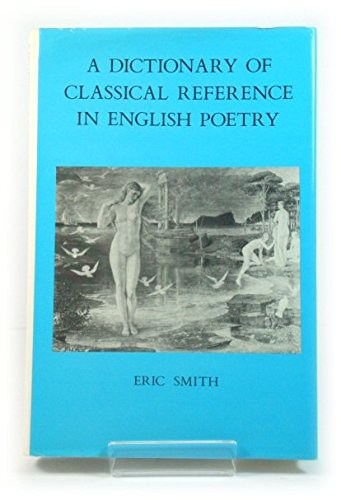
A guide to classical names and references in English poetry from Chaucer to the twentieth century, covering over 80 poets. Lists entries both by character/event, defining the classical myths or stories attached to the subject in question and giving the original source followed by a list of the references, and via a reverse index, arranged by poet and works.
Shows exactly how science-fictional words and their associated concepts have developed over time, with full citations and bibliographic information. Citations are included for each definition, drawn not only from science fiction books and magazines, but also from mainstream sources and the Internet.
The Historical Dictionary of Gothic Literature covers its history through a chronology, an introductory essay, and an extensive bibliography. The dictionary section has over 200 cross-referenced entries on the core texts, central authors, and the recurrent conventions that have distinguished writing in the genre for 250 years.
Based on literature, rather than 'universal' psychological archetypes, myths, or esoterica. Nearly two hundred entries explaining and illustrating common literary symbols (swan, rose, moon, gold), along with hundreds of cross-references and quotations. Concentrates on English literature, with entries ranging from the Bible and classical authors to the twentieth century, taking in American and European literatures.
Covering both established terminology as well as the specialist vocabulary of modern theoretical schools, this is a helpful guide to the principal terms and concepts encountered in debates over literary studies in the 21st century.
Although this kind of information is now more frequently found online (you can find some more online encyclopedias that aren't Wikipedia in this libguide), there are a number of literature-focused Encyclopedias in print in the library. Some examples are below:
The Encyclopedia of Postmodernism provides comprehensive and authoritative coverage of academic disciplines, critical terms and central figures relating to the vast field of postmodern studies.
Post-Colonial Literatures in English, together with English Literature and American Literature, form one of the three major groupings of literature in English, and, as such, are widely studied around the world. This encyclopedia documents the history and development of this body of work.
The Continuum Encyclopedia of American Literature serves as both guide and companion to the study and appreciation of American literature.
This reference work on African literature covers all the key historical and cultural issues in the field. The encyclopedia contains over 600 entries covering criticism and theory and African literature's development as a field of scholarship.
The Encyclopedia of Latin American and Caribbean Literature draws together entries on all aspects of literature including authors, critics, major works, magazines, genres, schools and movements in these regions from the beginning of the 20th century to the present day.
This major reference work is a guide to the study of English literature and critical assessment.
This reference is a comprehensive guide to literature written between 500 and 1500. While the volume is primarily devoted to the early literature of England, it also includes entries for historical persons and subjects of cultural relevance which would have been discussed in literary works or which might have affected their creation.
The Encyclopedia of American Poetry: The Twentieth Century contains over 400 entries that treat a broad range of individual poets and poems, along with many articles devoted to topics, schools, or periods of American verse in the century.
This is the first comprehensive multi-volume encyclopedia of literary and cultural theory.
Looks at literature in Canada from a variety of perspectives, acknowledging Canada's cultural plurality. Discusses literature in English and French, and also in other languages as Yiddish, Spanish, Haida and Cree. Commentaries on humour and satire, genre (including radio drama and the long poem), social history, film, television and popular culture, literary awards, language, critical theory, the oral literatures of the First Nations, petroglyphs, the publishing industry, journalism, gender, race, religion, region, myth, and class.
Provides lucid, concise explanations of myriad approaches to literature that have arisen over the past forty years, organized into three parts. In Part I, forty evaluative essays examine historical and cultural context, as well as the uses and limitations of the various schools and the key issues they address. Part II focuses on individual theorists, their influence, and their larger critical context. Part III deals with the vocabulary of literary theory, identifying significant, complex terms, and explaining their origins and use.
The library has a number of guides to effective writing and research in various aspects of literature and humanities disciplines, as well as more specific citation guides and guides to correct grammar.
You will most likely use the MLA citation style for academic papers in English classes. There is more information about that style and other specific citation styles in this guide.
Reorganized and revised, the third edition of the MLA Style Manual offers complete, up-to-date guidance on writing scholarly texts, documenting research sources, submitting manuscripts to publishers, and dealing with legal issues surrounding publication.
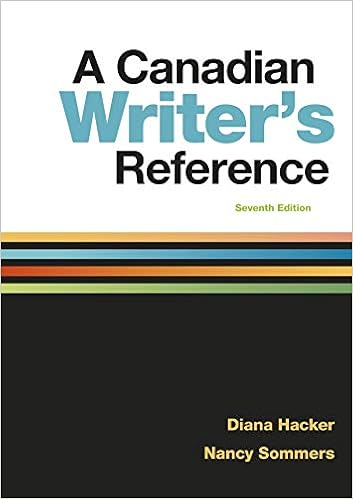
A Canadian Writer's Reference Seventh Edition and a variety of exciting digital options together represent a next-level tool for college writers, with an emphasis on help that is personal, practical, and digital. A Canadian Writer's Reference is reimagined as a system that offers innovative practice with writing, reading, thinking, and research; and that lives in an engaging multimedia environment. How-to pages, writing guides, student models, and exercises and activities deliver pragmatic, transferable lessons.
An indispensable language guide for anyone writing in the English language in Canada today. Provides answers to questions on abbreviations, hyphenation, spelling, the use of capital letters, punctuation, and frequently misused or confused words. Deals with letter, memo, and report formats, notes, indexes and bibliographies, and geographical names; also gives techniques for writing clearly and concisely, editing documents, and avoiding stereotypes. Also contains an appendix about presenting French words in an English text.
Learn to communicate exactly what you mean with this writing and speaking guide. From conjugating verbs to mastering punctuation to polishing your speaking skills, Perfect English Grammar makes it easier than ever to improve your grasp of grammar. Language learners of all levels can turn to this easy-to-navigate grammar guide for quick and authoritative information to improve everyday communication. Examples help you remember core grammar rules, and composition guidelines let you express yourself fully and accurately.
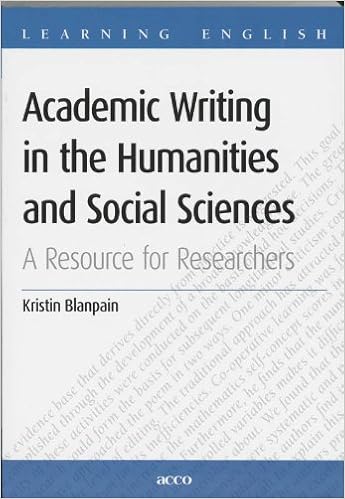
This book, specifically designed for the Humanities and Social Sciences, assists new and established scholars in the process of writing and editing English texts. Its objectives are threefold: to give guidelines for abstracts, research proposals, and research articles; to provide vocabulary and grammar resources for practice and consultation; to teach strategies for improving and editing their own writing.
The leading guide to research methods for final-year undergraduates, postgraduates taking Masters degrees, and PhDs students of Literary Studies. Each chapter centres on one particular method, offering both concrete practical advice and exploring some of the methodological issues that are involved in each method. The chapters cover research methods such as textual analysis, visual and quantitative methods, as well as auto/biographical methods, discourse analysis, interviewing, archival methods, ethnographic methods, and oral history.
A succinct guide to thinking critically and writing precisely about film. Both an introduction to film study and a practical writing guide, this brief text introduces major film theories as well as film terminology. With numerous examples, this guide progresses from taking notes and writing first drafts to creating polished essays and comprehensive research projects. Moving from movie reviews to theoretical and critical essays, the text demonstrates how an analysis of a film can become more subtle and rigorous as part of a compositional process.
Provides guidelines to help writers, editors, and publishers produce material that reflects Indigenous people in an appropriate and respectful manner. Guide contains a historical overview of the portrayal of Indigenous peoples in literature; common errors and how to avoid them when writing about Indigenous peoples; guidance on working in a culturally sensitive way; a discussion of problematic and preferred terminology; suggestions for editorial guidelines.
A brief, yet very important glossary containing a dictionary of basic terms for literature, composition, and grammar. Each area of language arts is divided into its own section, and a comprehensive index is also included. Examples are listed to illustrate meanings, as are reminders, hints, and tips that further define and elucidate the terms.
The library has an extensive collection of North American Indigenous literature. This libguide will help you find resources written by indigenous authors, as well as material about the works of these authors.